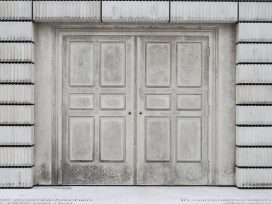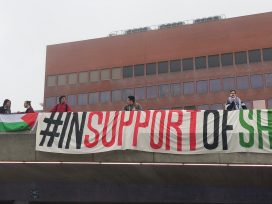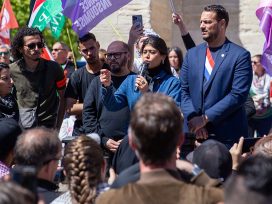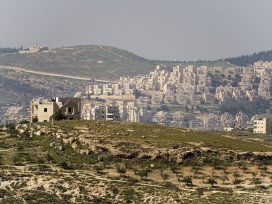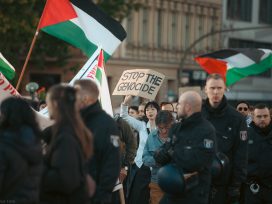Editor’s note: This article was first published in Index on Censorship on 9 November 2023. Since then, many of the author’s predictions have been tragically confirmed, above all that of a vast-scale civilian catastrophe in Gaza.
‘Where are you Mohammed?’ I muttered to myself while scrolling down my Facebook feed. Since the start of war in Gaza, as soon as I wake up in the morning, I check Facebook in search of reassuring signs that my Gazan friends are still alive. A week ago I noticed that for more than 24 hours there had been no new posts by Mohammed. I was extremely worried and immediately tried to click onto his own profile, only to find that his whole account had disappeared. I rang him and luckily found he was alive.
‘Where are you Mohammed?’ I asked, relieved.
‘I need to become invisible,’ he said and explained that he had to deactivate his account after receiving death threats. He was told that ‘traitors’ like him would be properly dealt with once hostilities were over. They made it clear, Mohammed told me, that they were not going to ask questions first and shoot later. They were just going to shoot. They were Hamas security forces.
A prominent poet among a new generation of gifted poets in Gaza, and an eloquent writer, Mohammed had for many years been a cautious critic of Hamas’ rule in Gaza. But with the unfolding horror of the Israeli retaliation for Hamas’ atrocious attack of 7 October, he could no longer restrain himself. His criticism of Hamas’s leadership and its recent disastrous war policies suddenly became uncompromising. He ridiculed those who praised Hamas’ Tawafan Al-Aqsa operation, Hamas’ name for its attack on Israel, pointing out that it was in general morally and politically damaging to Palestinian people and particularly destructive to Gaza citizens’ lives and properties.
In one of his posts Mohammed declared that Hamas did not represent him and his family, nor indeed people like him. He clearly stated that if his wife and two-year-old daughter, or any other members of his extended family, were killed under Israeli bombardments, he would hold Hamas as responsible as Israel.
Mohammed is a descendant of a refugee family. His grandparents escaped to Gaza during the war of 1948. He himself was born in a refugee camp. Since 2007, when the Palestinian Authority (PA) was ousted from power in Gaza, Mohammed has lived under Hamas’ rule. Like many people of his generation, especially creative, liberal-minded people, he has been calling for peaceful engagement with the Israelis, whether through nonviolent protests or peace negotiations, in the hope that life in Gaza could somehow become less insufferable. But to no avail.
Voices of dissent in Gaza have been getting louder since 2007, especially after Hamas’ various disastrous military engagements with Israel. But since 7 October, and given the scale of the ongoing catastrophe that has resulted from that day, many people in Gaza have completely lost patience. There can be no end to the tragic situation in Gaza, they have come to believe, without the total disarmament of Hamas and other militant groups.
Hamas has never tolerated critical views of its leadership and polices. A 2018 report from Human Rights Watch revealed that Hamas carried out scores of arbitrary arrests for peaceful criticism, typically targeting supporters of the PA following the Fatah-Hamas feud. When there have been protests, they’ve quickly been crushed.
But critics, such as Mohammed, are independent voices, not affiliated with the PA. They do not represent an alternative authority. Indeed sometimes they are as critical of the PA as they are of Hamas. To this end Hamas has largely turned a blind eye to them. Hamas has also wanted to appear in front of its ‘friends’ in the West to show a degree of respect for freedom of speech. Now things have changed; with its entire fate on the line, they’ve accelerated efforts to stamp out any voices of dissent.
People in Gaza are praying for an immediate and lasting ceasefire, which they see as their only chance of surviving. But for Mohammed, and dissidents like him, leaving Gaza altogether might be the only way to survive both the danger of Israeli bombardment and Hamas’ prosecution. He is hoping to escape to Egypt as soon as possible and in whatever way possible.
‘This is our second Nakba (catastrophe),’ he told me, the first being the war of 1948 which turned his grandparents and their successors into refugees in Gaza. Were he to succeed in escaping from Gaza, he, his wife and his daughter would suffer the life of refugees all over again.
With people like Mohammed leaving, Gaza will be left with no one who can freely express their views apart from Hamas supporters whose extreme political views and visions are delusional. Some of these people believe that the ongoing war is bound to cause the total destruction of Israel. With people like Mohammed gone, there will be nobody in Gaza left to challenge their absurdly self-destructive views.
‘Every word is being monitored’
Yet had Mohammed been born in what after 1948 became the State of Israel, and thus became a Palestinian citizen of Israel himself, he would still have no other option but to stay silent, even in the absence of death threats. After all it’s not just anti-war voices in Gaza that are being gagged. While searching for posts by Gazan friends I noticed that Palestinian-Israeli friends were suspiciously quiet too.
I had known them to be typically outspoken in their criticism of both the Israeli government and Palestinian leadership – in the West Bank and Gaza – so I was surprised to see no posts of theirs, nor any comments on posts related to the Hamas’ assault and subsequent Israeli reprisals. I wrote sarcastically, wondering out loud, whether Palestinian-Israelis were keeping silent out of fear of Hamas’ rockets. The next day I received a private message with one simple question: ‘Haven’t you heard what’s happened to Dalal Abu Amneh?’
Dalal Abu Amneh is a popular Palestinian singer, influencer and doctor from Nazareth. She had been questioned by the Israeli authorities, I soon learned, over an Instagram post consisting of only a single Quranic verse, the meaning of which was that there is no ultimate victor but God. For some reason the Israeli police suspected that the use of such verse was an expression of solidarity with Hamas, and so she spent two days in detention.
Then I received news that activists from Standing Together, one of the largest grassroots Israeli-Palestinian groups working for peace, had been arrested in Jerusalem for putting up posters with the message: ‘Jews and Arabs, we will get through this together.’
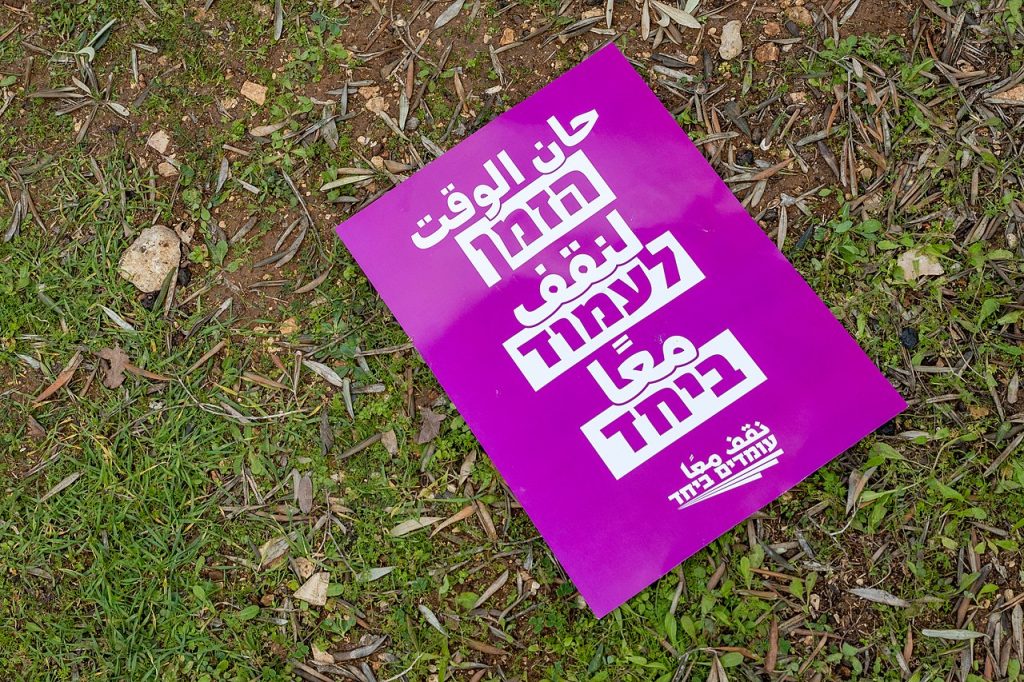
Leaflet of the Standing Together movement. Photo: Oren Rozen / Source: Wikimedia Commons
The Israeli public debate has also not been immune from the decline of rationality. Some far-right politicians and news commentators have even been arguing that destroying Gaza in the same way that cities like Dresden and Hiroshima were destroyed during World War II is the best possible way to put an end to the danger posed by Hamas.
Israel is considered the only democracy in the Middle East, yet its Palestinian citizens are frightened to protest against such calls for mass murder of the civilians of Gaza. Hoping to find out the source of such fear, a few days after the start of the war, I got in touch with Noha, a Palestinian friend from Haifa. Noha is a teacher and writer and she is usually chatty and blunt in expressing her opinions, but this time she seemed withdrawn and reticent.
‘We can’t write anything about the current situation,’ she replied curtly.
I asked whether Palestinians in Israel are frightened because they are exposed to a general sense of intimidation or whether there were actually state laws which prohibited them from freely expressing their views. Again her reply was brisk, ‘Every word is being monitored.’
‘Who is monitoring every word?’ I hoped to hear her explanation but she remained silent in a way that implied that our private conversation itself was being monitored. I nearly told her, jokingly, that she was just being paranoid; but after what had happened to Dalal Abu Amneh, a couple of days earlier, I couldn’t blame her even if she was merely being paranoid.
The Israeli government has vowed to continue its offensive until Hamas is eradicated. Those of us with first-hand knowledge of politics and history in Palestine-Israel know for sure that such an objective could not be achieved unless the whole of Gaza was totally destroyed. In other words, in order to achieve its goal, the Israeli government would have to follow the advice of those who have been calling to do to Gaza what was done to Dresden or Hiroshima.
In a later conversation with Mohammed he told me that many ordinary people in Gaza believe that Hamas is going to win in the end. ‘But how can that be when it’s obvious that Hamas is fighting for its life?’ I protested. ‘Or is it the case that its mere survival would be considered a victory?’
‘The people of Gaza have been living under siege for more than 16 years,’ Mohammed said, adding that things have been getting despairingly worse. ‘Isolation and despair have made people seek refuge in political fantasies and delusions,’ he explained.
Mohammed told me that when the news broke out, on the morning of 7 October, hundreds of Gazan civilians crossed the border into Israel literally following in the footsteps of Hamas’ attackers. The aim of some of these civilians was looting wealthy Israeli homes and properties. Others, however, believed that they were going home, returning, to the land from which their ancestors had fled during the war of 1948. They believed Israel was being conquered and that the Israeli population were leaving, and they, the civilians, wanted to make sure that they got in before anybody else so they could occupy the best vacant properties.
Political delusions and absurd views, such as the ones expressed by extremists on both sides, would be harmless if those who held them were not in power, nor armed. But that is not the case in Gaza and Israel. With the silencing of voices of reason such insane views could very easily win the attention of those in charge. The outcome would be a disaster on a scale not witnessed since World War II.
